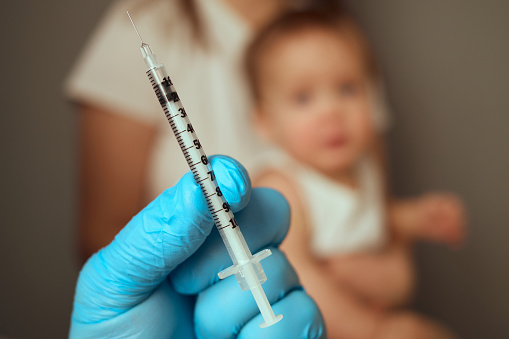Mother Reveals Why She Stopped Vaccinating Her Son

A Mother’s Journey Through Vaccination Decisions
Zoe Nichols, a 39-year-old beauty therapist, recalls the heart-wrenching moment when her son underwent his third round of baby vaccinations. The experience left her feeling helpless as her child cried nonstop, despite being given Calpol to ease the discomfort. She wanted to stay with him, but work commitments forced her to drive him to his grandparents’ house for the night. During the two-hour trip, the baby mostly slept, which gave Zoe some relief. However, upon returning home, she received a distressing call from her parents, who reported that her son was still crying and had a high fever that wasn’t responding to medication.
The doctors initially dismissed the situation as a common virus, but Zoe couldn’t shake off the guilt of not being able to help her child. Eventually, her son was admitted to the hospital for treatment, and Zoe spent the night anxiously waiting by her phone. The next morning, she received a photo of her son, who had returned to his normal self. This event marked the beginning of her growing doubts about the effectiveness of vaccines.
As a child, Zoe had received all her vaccinations, yet at 15, she contracted measles. Two years later, during beauty college, half of her class fell ill with mumps—some had been vaccinated, others hadn’t. These experiences made her question the purpose of vaccines and whether they truly worked. When she became pregnant at 31, she started considering what was best for her future child.
At an NCT class, she was strongly encouraged by a midwife to follow the NHS guidelines for vaccinations. “You take all the information as gospel,” Zoe explains. “But I think everyone should have access to both pros and cons.” Despite some acquaintances warning her about potential side effects, she decided to proceed with the MMR vaccination for her son.
Her son’s initial vaccinations were relatively smooth, with only mild fevers managed by Calpol. However, it was the 16-week shots that Zoe believes led to her son’s hospitalization. “I thought it came on too quickly to be a virus,” she says. Later, when the BCG vaccine was suggested to protect against tuberculosis due to her husband’s family visiting from India, Zoe followed medical advice again. Unfortunately, the injection site became scabbed and took a long time to heal, leaving a noticeable scar. This experience was the final straw for Zoe, and she decided to stop vaccinating her son altogether.
Since then, her son has not received any of the standard childhood vaccines, including those for flu or COVID-19. “I’m not a scientist, but I know what happened for me and mine,” she says. “I don’t want to look at stats and figures because they can be manipulated by pharmaceutical companies.”
Her decision has drawn criticism from healthcare professionals and friends, who urge her to protect her son through vaccination. One instance in early 2023 involved her son being rushed to the emergency room after struggling to breathe at nursery. When she explained that he hadn’t received any vaccines, the nurse’s reaction was dismissive and judgmental, making Zoe feel accused of neglect.
Zoe insists that her choice is based on her personal experiences, not fear. She questions why people are quick to judge anti-vaxxers without understanding their reasons. “Why are they so for vaccines?” she asks. “My child was in the hospital overnight directly after a vaccine. That’s why I’m against it.”
News of rising measles cases in the UK doesn’t scare Zoe. Instead, she worries about the potential harmful effects of vaccines. She wonders why society scrutinizes food and water but rarely questions what goes into vaccines. “I think there are pros and cons to everything,” she says.
Zoe believes that if her son contracts measles, he will recover like she did at 15. However, recent data shows a significant increase in measles cases across Europe, with nearly 130,000 infections last year. In June, a child in Liverpool died from the disease. While she acknowledges the pain of families affected, her personal experiences prevent her from changing her stance.
She takes precautions to keep her family and others safe, such as ensuring her son washes his hands after playdates and before meals. She also avoids contact with sick clients and wears a mask during treatments. “In my opinion, there are better ways to stop disease spreading than vaccinating people,” she explains. “Safe measures like handwashing and sanitizing can make a big difference.”
Zoe is determined to guide her son away from injections until he can make an informed decision himself. “I’m not a radical conspiracy theorist,” she clarifies. “I’m just being mindful and conscious. It’s my choice, and I don’t want myself or my child to be an experiment.”
Expert Perspective on Vaccinations
Dr. Hana Patel, a GP consultant for Superdrug’s Online Doctor, emphasizes the importance of vaccines in protecting children from serious diseases. “When vaccines are missed, children lose a vital layer of protection against diseases that spread quickly in schools,” she explains. “Measles, for example, is highly contagious—just one infected child can spread it to 9 out of 10 unvaccinated classmates.”
Vaccines work by introducing tiny, safe fragments of viruses or bacteria to train the immune system. This preparation allows the body to fight off real infections without becoming seriously ill. High vaccination rates create herd immunity, which protects vulnerable individuals, such as newborns and those with medical conditions.
Dr. Patel warns that dropping vaccination rates can lead to outbreaks. “Measles, once close to elimination, has resurged in parts of the UK and Europe because people are missing their jabs. Without widespread vaccination, diseases can re-establish themselves, leading to avoidable illness and hospitalizations.”
Post a Comment